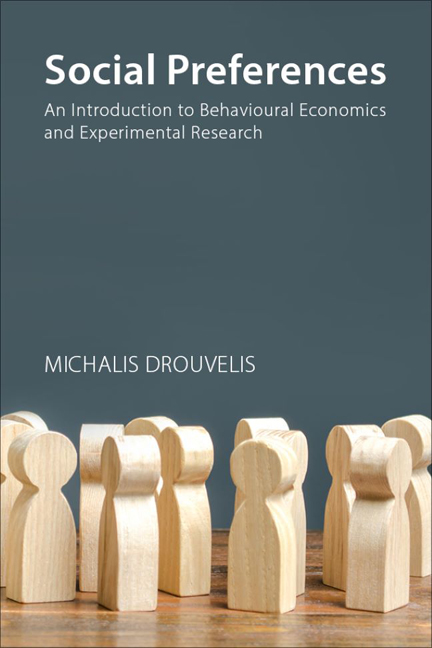Book contents
- Frontmatter
- Contents
- Preface
- 1 Introduction
- 2 Bargaining games
- 3 Trust and gift exchange games
- 4 Public Good Games I
- 5 Public Good Games II
- 6 Leadership
- 7 Public good games with sanctioning I
- 8 Public good games with sanctioning II
- 9 Cross-cultural experiments
- Appendix A Experimental instructions
- Appendix B Practical information
- Notes
- References
- Index
4 - Public Good Games I
Published online by Cambridge University Press: 22 December 2023
- Frontmatter
- Contents
- Preface
- 1 Introduction
- 2 Bargaining games
- 3 Trust and gift exchange games
- 4 Public Good Games I
- 5 Public Good Games II
- 6 Leadership
- 7 Public good games with sanctioning I
- 8 Public good games with sanctioning II
- 9 Cross-cultural experiments
- Appendix A Experimental instructions
- Appendix B Practical information
- Notes
- References
- Index
Summary
Introduction
One of the most fundamental issues in the social and behavioural sciences is to understand whether and if so, under which conditions individuals are willing to cooperate in situations where personal interests are at odds with collective benefits. These situations reflect many naturally occurring environments including voting, tax compliance, corruption, teamwork, environmental protection. In all these cases, a rational individual who cares about maximizing their own payoff will always choose to free ride and rely on the contributions of others. In contrast, the society as a whole will benefit by having individuals cooperating and contributing towards the social good. A well-known example is the so-called “Tragedy of the Commons” (Hardin 1968). In this setting, each farmer caring only about their own welfare has an incentive to let as many cattle as possible use the commonly shared resource. However, this sort of behaviour comes at the expense of each other farmer as this would lead to overconsumption and eventually, the depletion of the common resource. If farmers, on the other hand, manage their common-pool resources in a sustainable manner, the resulting outcomes would be better for the welfare of the society. This conflict between personal and collective goals has attracted the interest of behavioural economists who have systematically explored the circumstances under which human cooperation can be achieved when strong financial incentives suggest the opposite.
The most commonly used framework that has been employed to understand human cooperation in a controlled laboratory context is the so-called “public good game”. The structure of this game is very simple: subjects randomly form a group of n members, each of whom is given a fixed endowment of E tokens. Their task is how to allocate their fixed endowment between their private account and a public account. Allocating tokens in the private account benefits only the group member, whereas allocating tokens in the public account benefits the other members of the group. In order to capture the tension between personal gains and collective goals, the parameters of the game are such that a rational and selfish group member will always free ride (i.e. contribute zero tokens to the public account).
- Type
- Chapter
- Information
- Social PreferencesAn Introduction to Behavioural Economics and Experimental Research, pp. 49 - 64Publisher: Agenda PublishingPrint publication year: 2021



